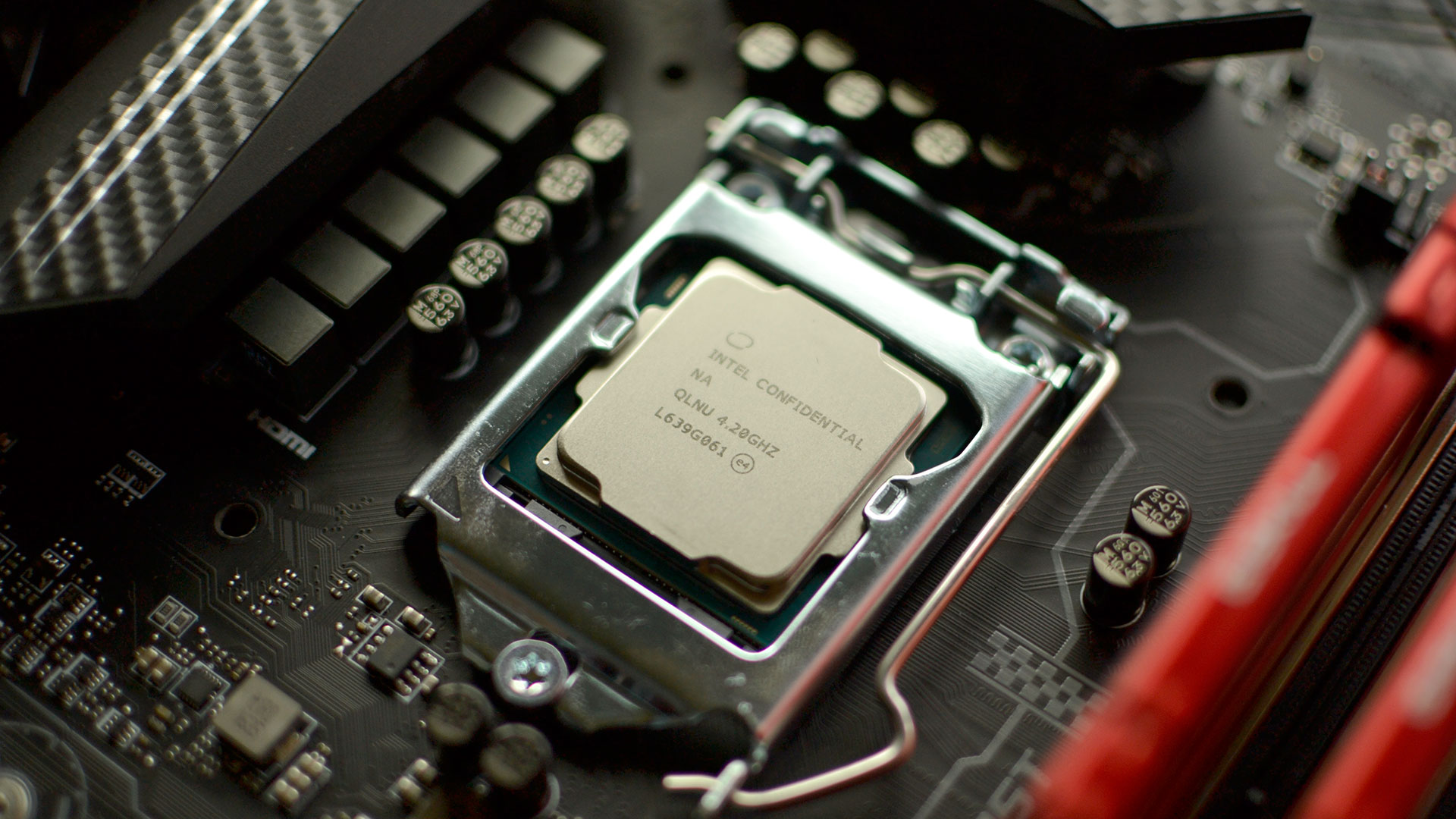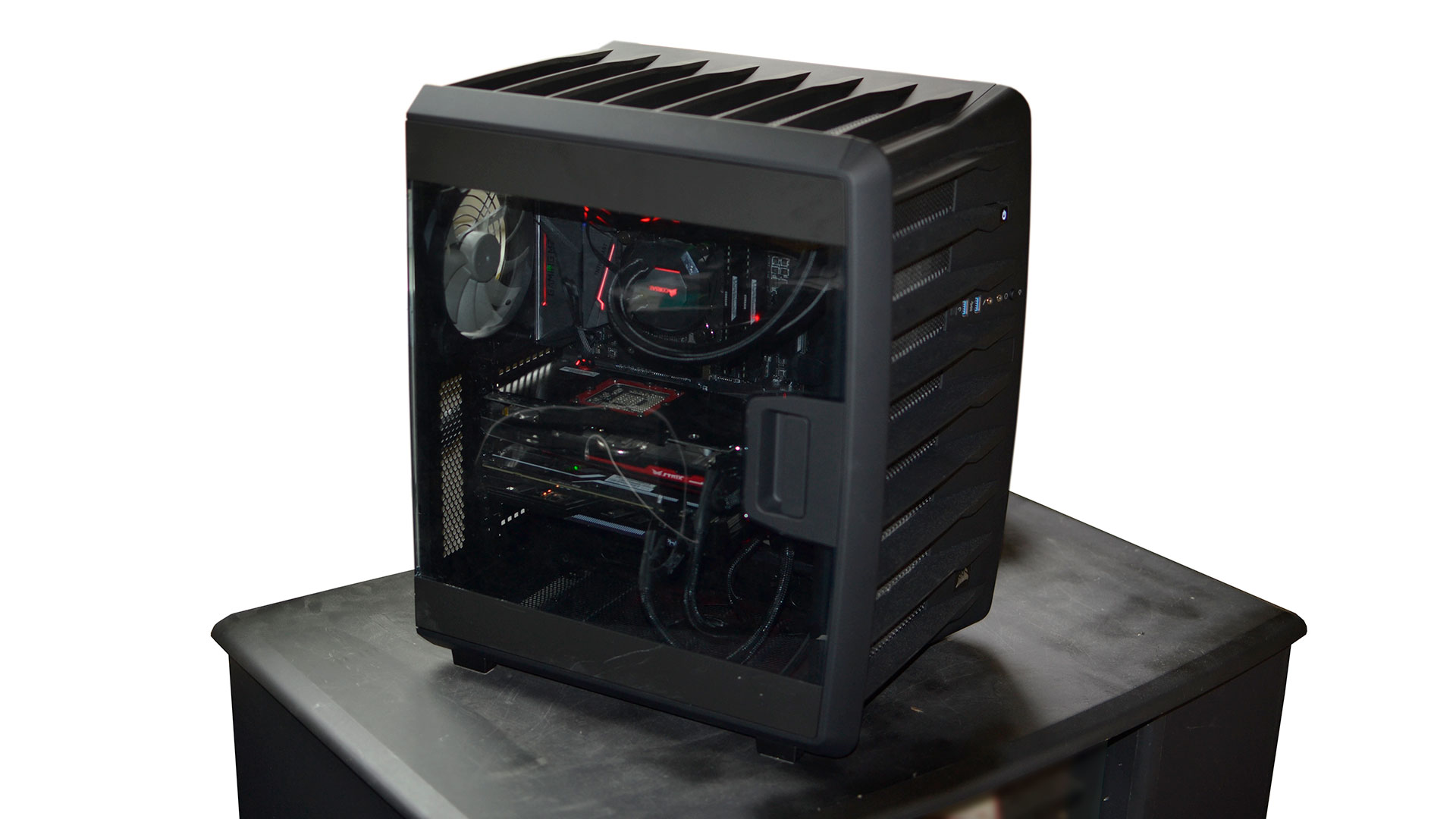Our Verdict
The i7-7700K is Intel's highest clocked CPU ever, but ultimately it's only a minor update to Skylake with incremental improvements.
For
- Highest clocked Intel CPU and 5.0GHz overclocks
- 4K HEVC encode/decode acceleration
Against
- Slightly faster than Skylake and still only quad-core
- Discrete GPU use bypasses the video/graphics features
PC Gamer's got your back
Depending on how you want to count generations, Kaby Lake is the eighth Intel Core CPU (Bloomfield/Nehalem, Westmere/Clarkdale, Sandy Bridge, Ivy Bridge, Haswell, Broadwell, Skylake, Kaby Lake), but it bears the 7th Generation nomenclature. Intel has often played it a little loose when it comes to processor model names, for example naming the 'Enthusiast' platform CPUs as architecture generation + 1 (e.g. Haswell is 4th Gen, but Haswell-E has 5000 series model numbers), and somehow Core Duo and Core 2 Duo aren't part of the Core genealogy. Regardless, Kaby Lake is 7th Generation Core, so let's continue.
I'm looking at Intel's new king of the hill, the Core i7-7700K. This is the 'optimization' phase of Intel's new Process-Architecture-Optimization paradigm, and what's being optimized consists of two major items and a handful of smaller tweaks. The first major change is an improved 14nm process (dubbed 14nm+) that should improve clock speeds and power characteristics thanks to changes in the fin height and straining of the silicon, and the second change involves updates to the video/multimedia block to support hardware decoding and encoding of 4K H.265 (which includes HEVC, VP9, and other formats).
If you're looking for the bigger picture with Kaby Lake and the 7th Gen Core processors, check out our main Kaby Lake hub.
The most immediately visible result of the optimizations is that the i7-7700K is clocked higher than the previous generation i7-6700K, and it will overclock higher. Beyond that, if you're using the integrated HD Graphics 630, you can get lower CPU utilization for certain 4K video decoding, and in an exclusive tied to Microsoft's Edge browser, you can stream 4K Netflix content. I've also looked at gaming performance on Kaby Lake's HD 630 integrated graphics. TL;DR: it's not high enough that I'd recommend serious gamers forgo buying a discrete graphics card.
Along with higher clock speeds, the i7-7700K can also work in existing 100-series chipset motherboards, or it can go into the new 200-series boards. This should mostly be a non-issue, but Z270 does include support for 24 PCIe Gen3 lanes (compared to 20 on Z170), and it also brings support for Optane Memory—a technology that will use some form of SSD caching to improve performance, though it's not yet available.

Roughly one third of the CPU die is devoted to graphics and multimedia functions.
The combination of improved clock speeds and minor architecture tweaks mean that, in practice, the real gains from Kaby Lake will be minor at best. 4.5GHz turbo compared to 4.2GHz turbo on the i7-6700K and 4.2 base vs. 4.0 base give the expected performance differential of five to seven percent. Overclock both processors and you're looking at 4.7GHz against 5.0GHz (give or take). Pardon me while I stifle a yawn.
But what about all those cool new media functions—surely they must be good for something? They are, but only if you use the integrated graphics (meaning, you have a display hooked up to the motherboard video outputs)—something anyone playing games is unlikely to do with the i7-7700K. Most people buying an i7-7700K will bypass the HD 630 and video decoding blocks, and it's worth pointing out that Nvidia and AMD GPUs also support a variety of video codecs.
Core i7-7700K performance
I've already discussed all of these aspects of Kaby Lake, but never rendered a final verdict. This is the shorter executive summary of the i7-7700K, focusing on a single product rather than the entire Kaby Lake lineup. CPU and gaming performance with a dedicated graphics card is the same as before, but here I'm highlighting just the i7-7700K in the charts, with both overclocked and stock clocked performance. I'll get to those in a moment, but let's start with a short discussion of the video/graphics/multimedia performance.
First, 4K streaming when you're using the HD Graphics 630 works really well—and CPU utilization is very low with Netflix 4K as an example. Intel claims that laptops with Kaby Lake will get up to 9.5 hours of battery life while decoding 4K video, which is an excellent result. Does that matter to desktop users? Probably not, since they'll be plugged in and most likely running a dedicated graphics card. The 4K Netflix support also features DRM, like it or not—we should place wagers on how long it will be before someone cracks this DRM. Of particular note, the DRM means 4K Netflix streaming can only work via the integrated video ports.
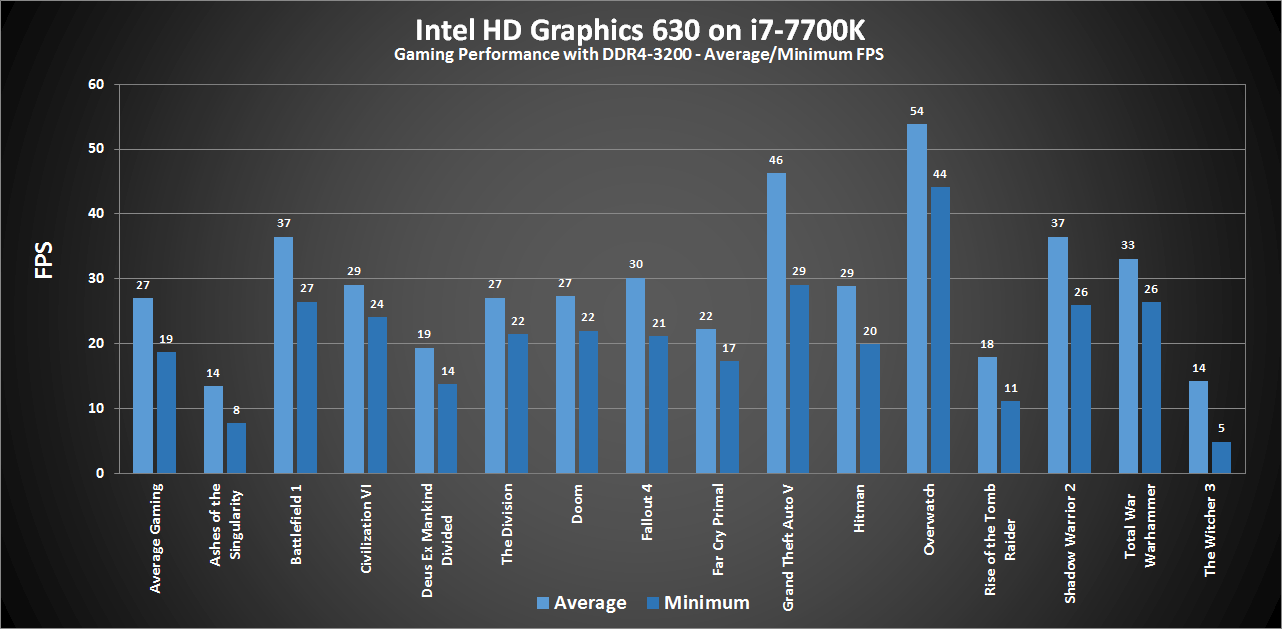
As for graphics performance, I gave the HD 630 every possible advantage by running DDR4-3200 memory. The result is weak compared to even the lowest tier of modern GPUs (GTX 1050 and RX 460), with HD 630 failing to break 30 fps average at 1280x720/1280x768 in most of the games I tested. All is not lost, however, as the games I test are quite demanding. If you're only interested in lighter fare like Dota 2, League of Legends, CS:GO, and Overwatch, HD 630 is sufficient. But for more demanding games, you'll either need a graphics card or you'll need to look at mods that will further reduce graphics fidelity to the point where you can get playable results. And if gaming on a budget is your intent, you'd never give Core i7 parts a second thought.
Number crunching with i7-7700K
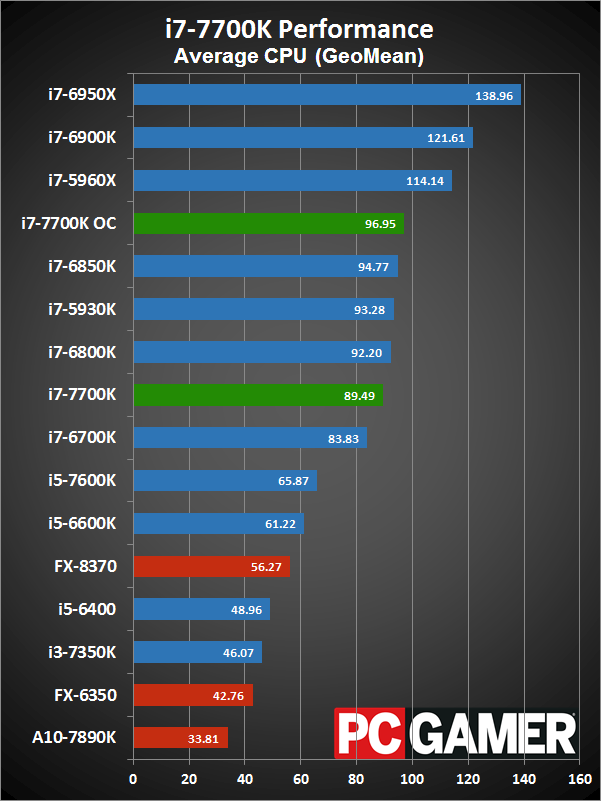
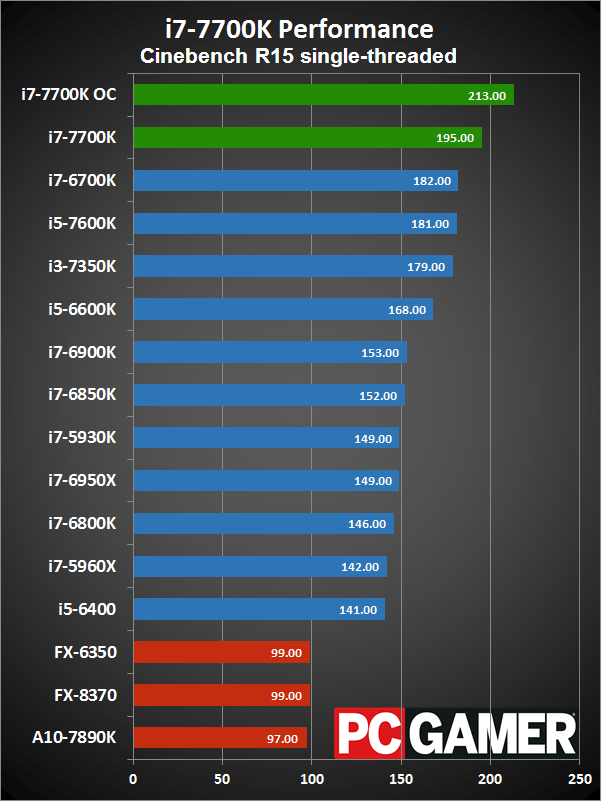
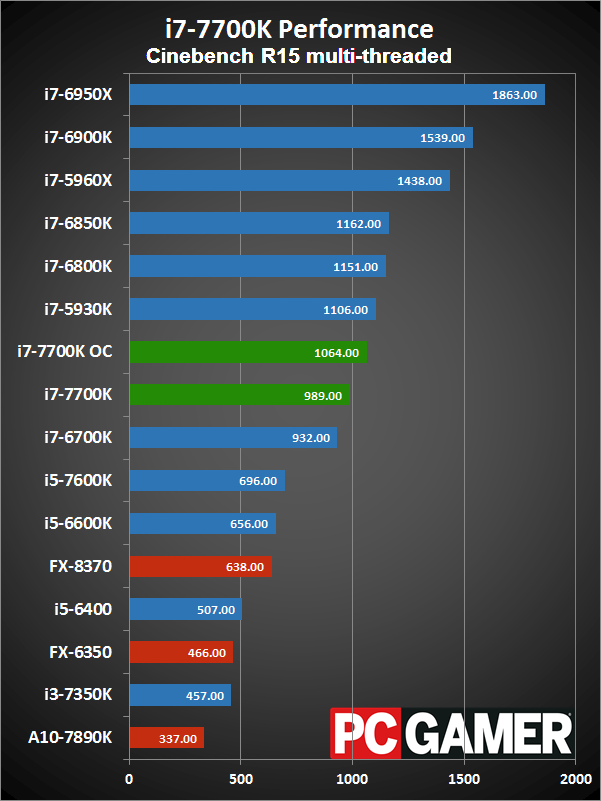
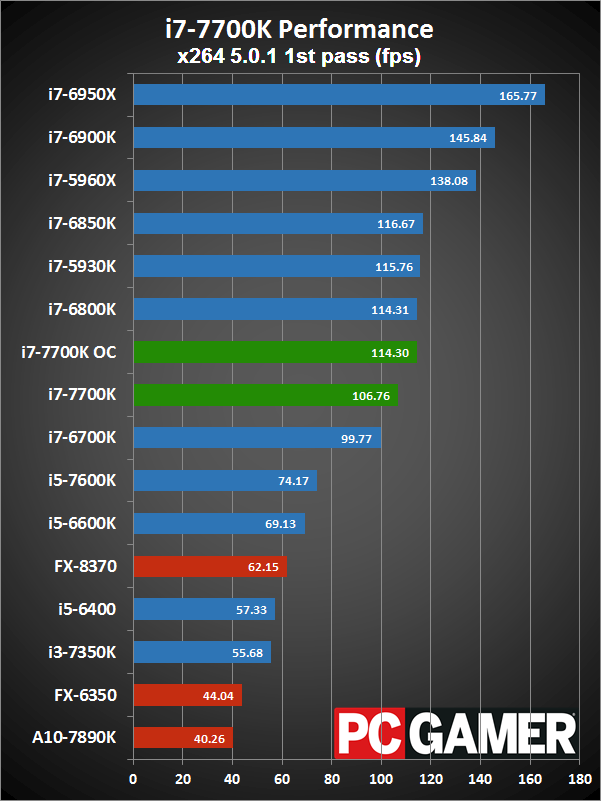
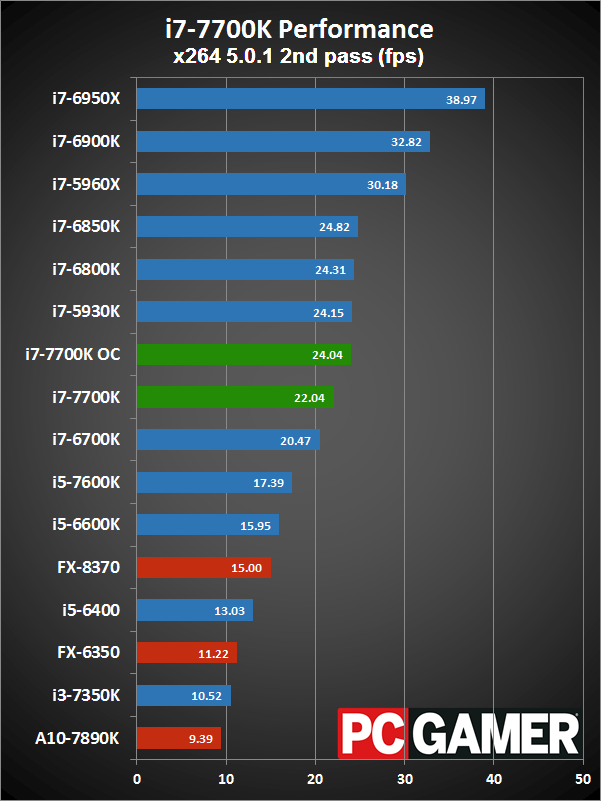
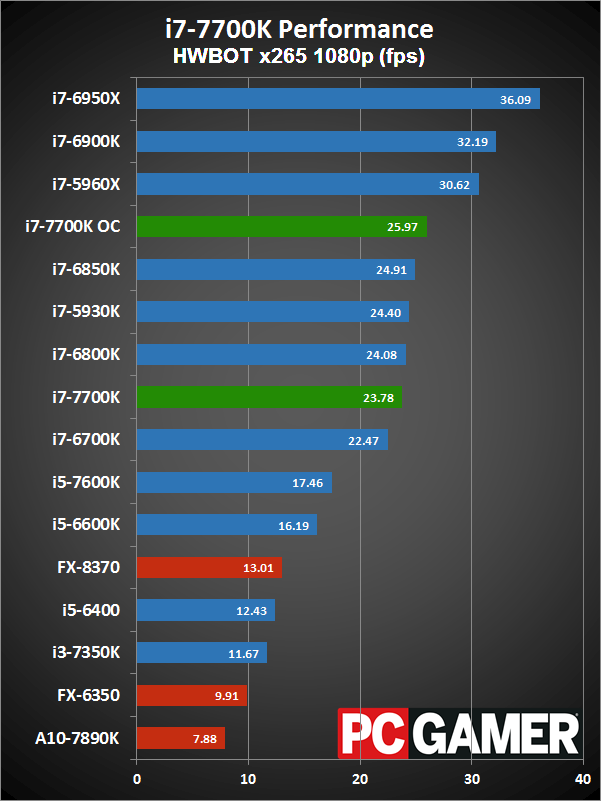
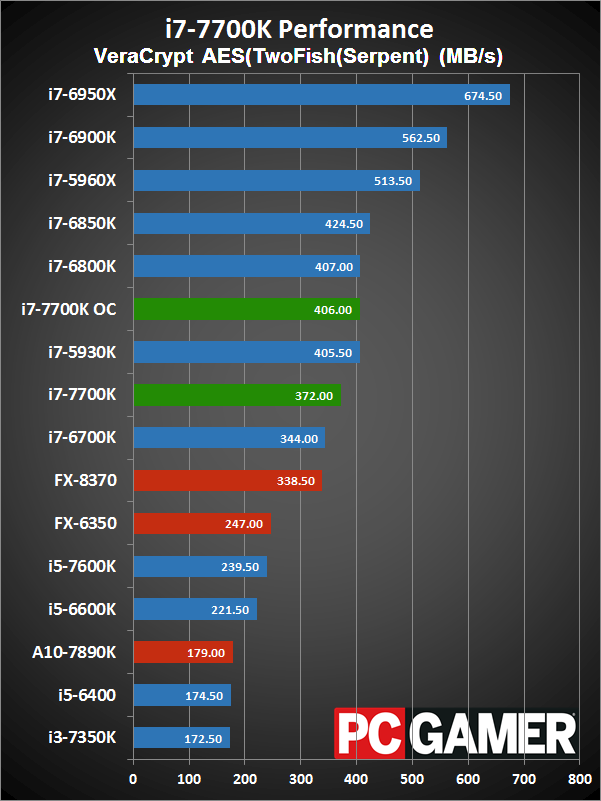
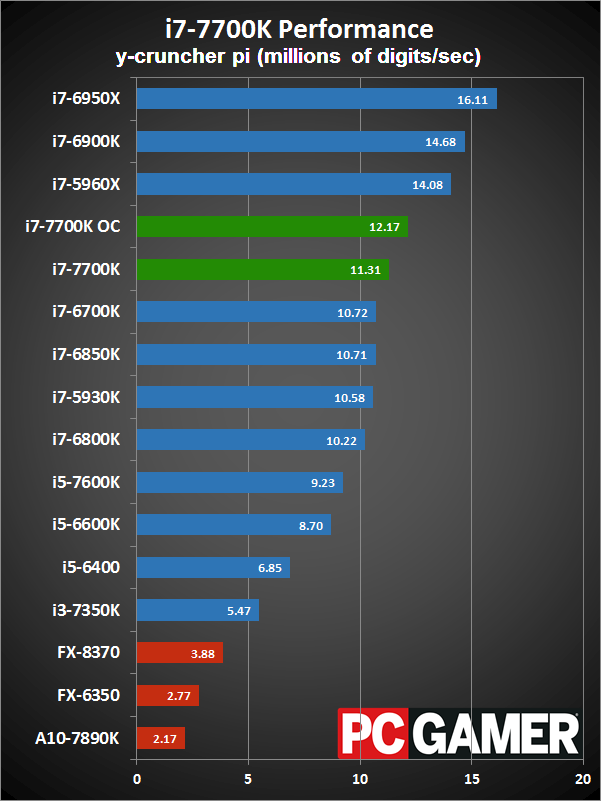
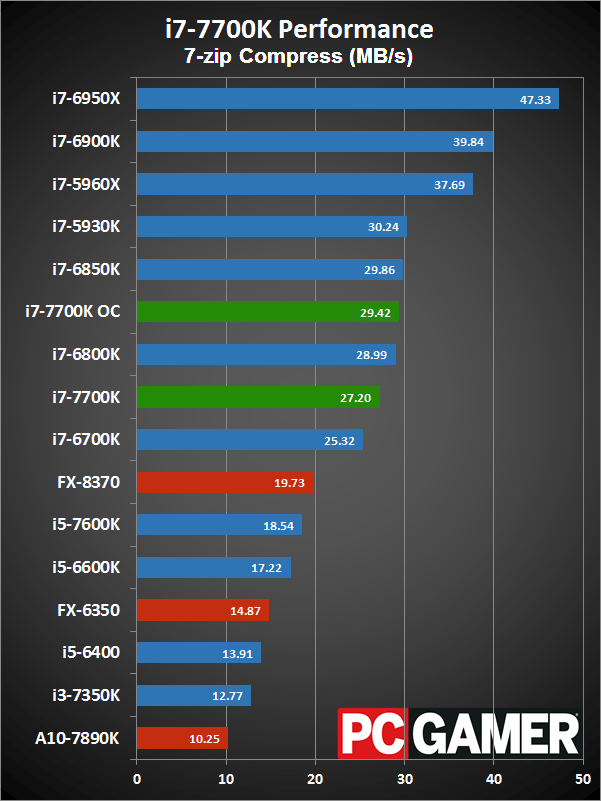
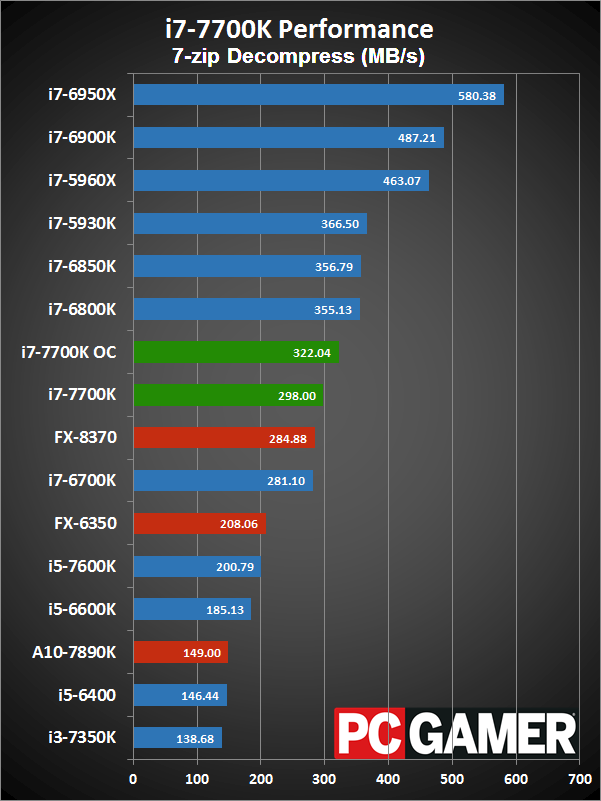
Looking at CPU performance, I'm including stock performance from all of the other processors, though you can view the overclocked performance in the main Kaby Lake hub. Single-threaded performance is a clear highlight of Kaby Lake, with the stock and overclocked 7700K claiming the two top spots in Cinebench's single-threaded test. Also worth note is that in many of the heavily threaded benchmarks the overclocked 7700K is roughly equal to the various 6-core Haswell-E and Broadwell-E CPUs.
In the overall ranking, the 7700K OC beats all three of the 6-core chips we tested. Obviously, overclocking the 6-core chips changes the story, but only by substantially increasing power use. Even when overclocked, the i7-7700K uses less power (165W under load) than the various Haswell-E/Broadwell-E processors (165-200W), thanks in part to a more power efficient platform.
This isn't too shocking since we're comparing 4.2-4.5GHz 4-core against 3.4-3.8GHz 6-core parts, with the 4-core part sporting an improved 6-wide superscalar architecture and other tweaks. Clock speeds account for about 25 percent of the difference, and the architecture (and limited scaling going from 4-core to 6-core) often makes up the rest of the core count deficit. It will be interesting to see what Skylake-X and Kaby Lake-X bring to the table later this year, when they get the architectural and platform enhancements.
Overall, the i7-7700K is a modest improvement over the i7-6700K, beating Skylake by a margin that equals the difference in clock speed—six percent, give or take. And this is the best case scenario where I'm testing applications designed specifically to show small differences in CPU performance. In general use, few people would ever notice the difference between a Skylake and Kaby Lake processor.
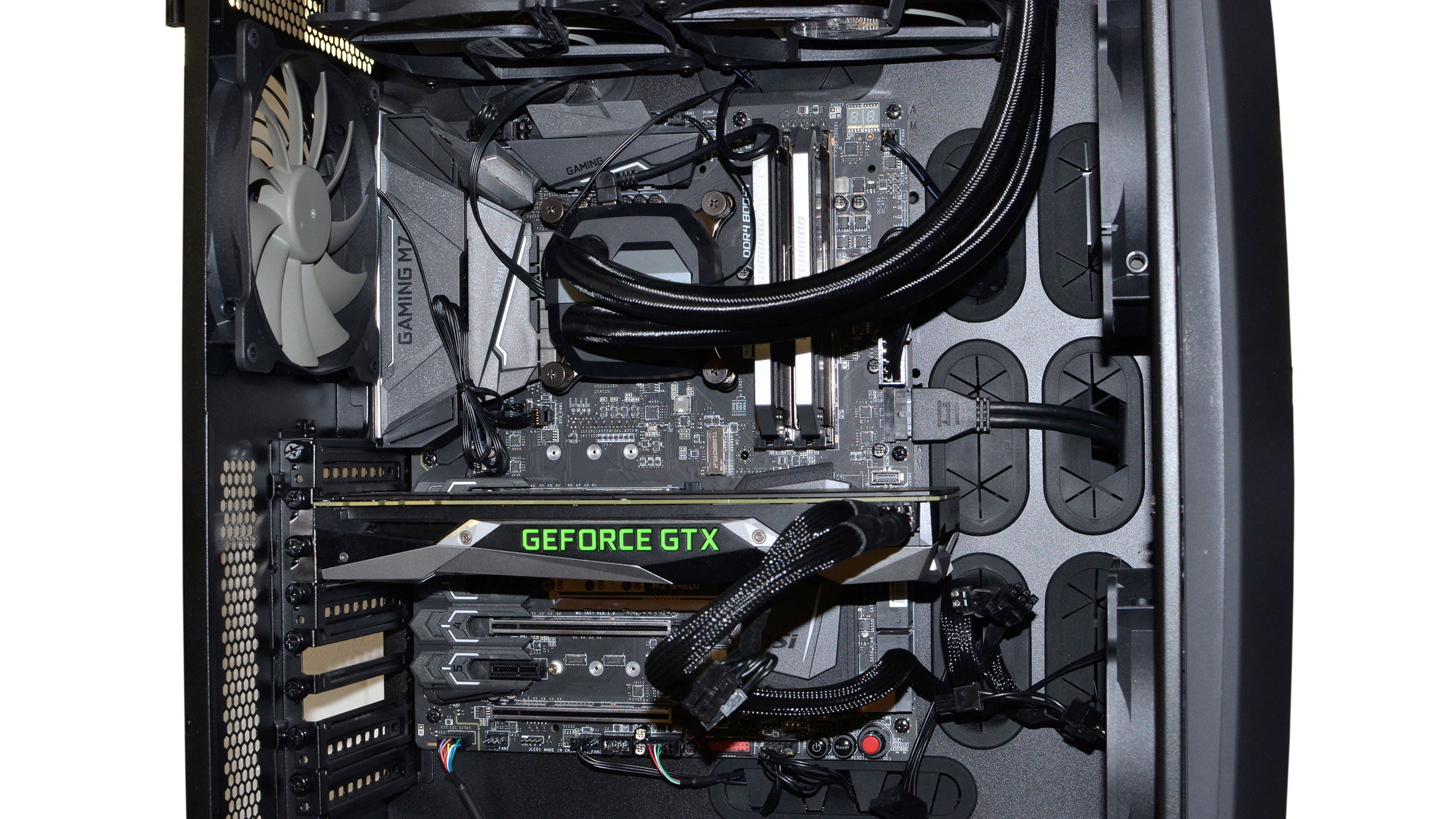
Gaming on the i7-7700K
If the difference in raw CPU performance isn't particularly noteworthy, the gaming potential of the i7-7700K is even less so. It's not that CPU performance doesn't matter for games, but it's a far less important aspect than graphics performance. Even with a GTX 1080, most of the fastest CPUs are within a few percent of each other. (Testing for all CPUs was done with Nvidia's 376.33 drivers.)
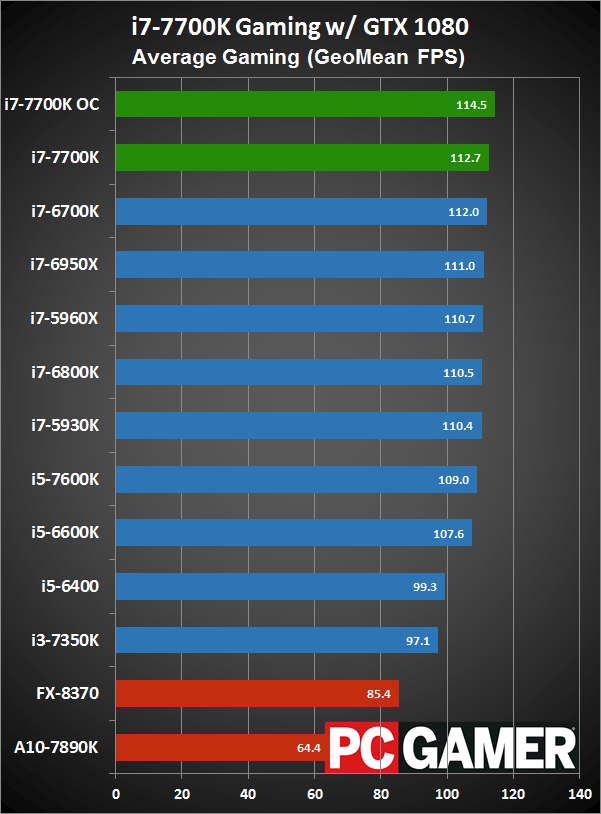
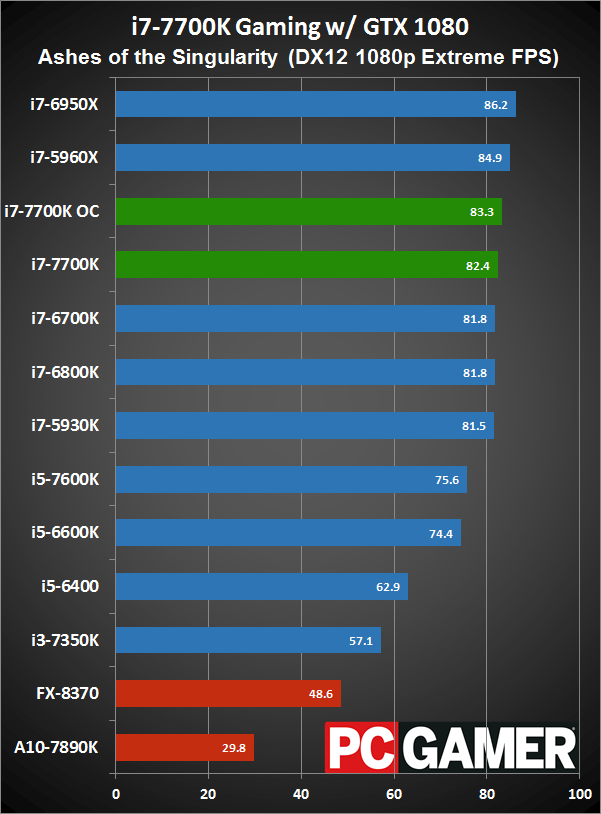
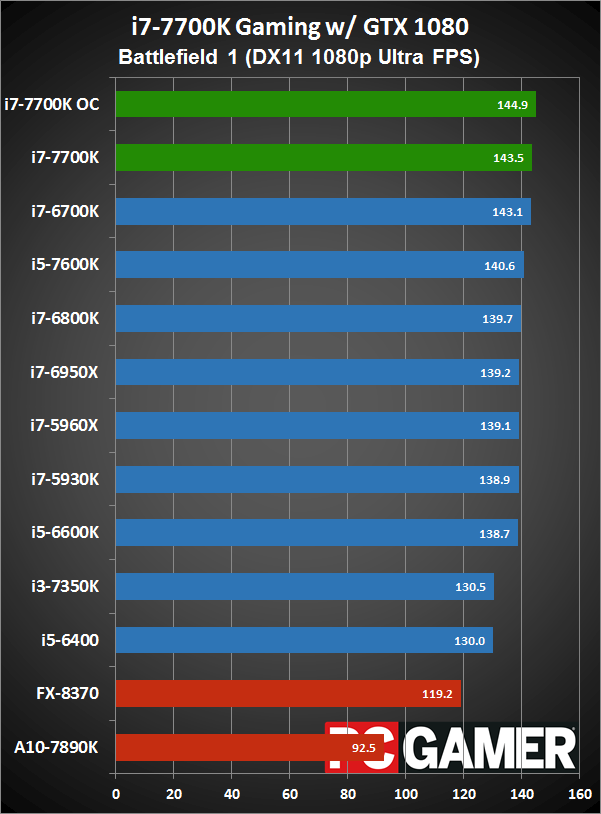
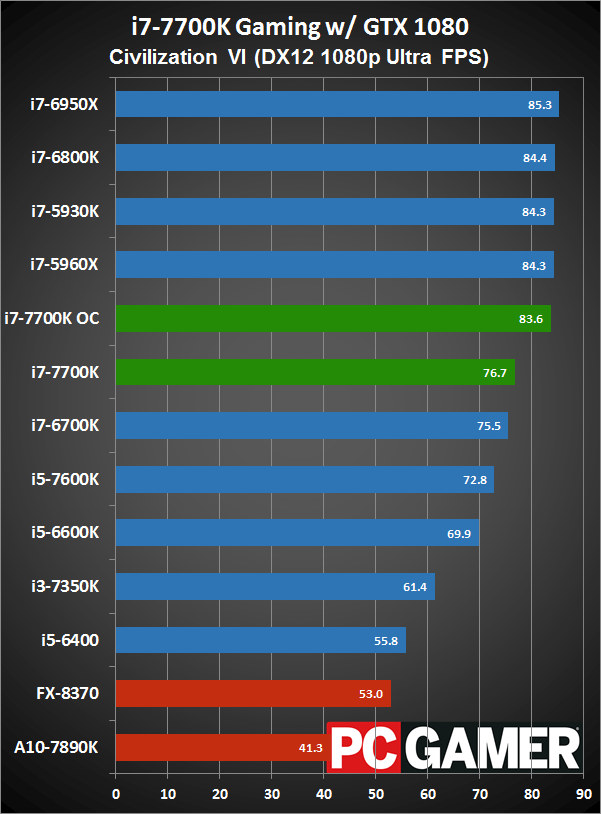
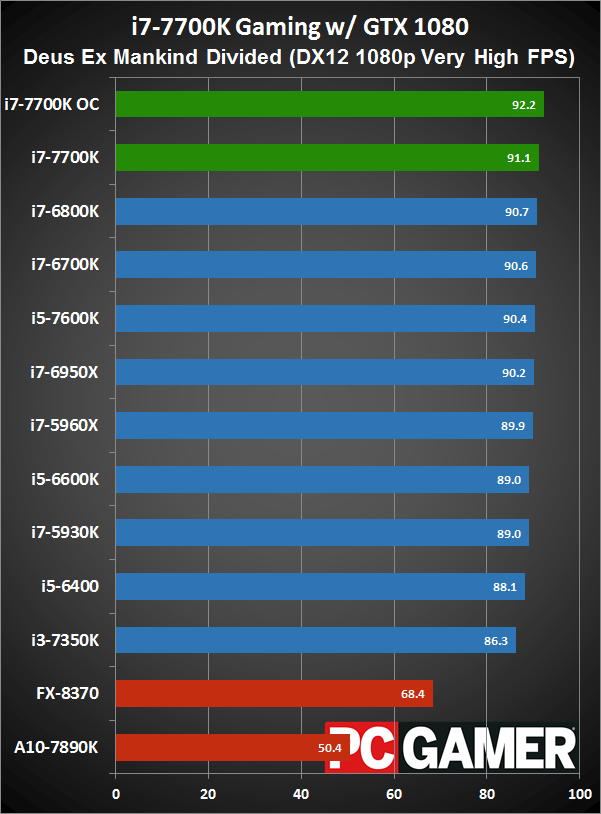
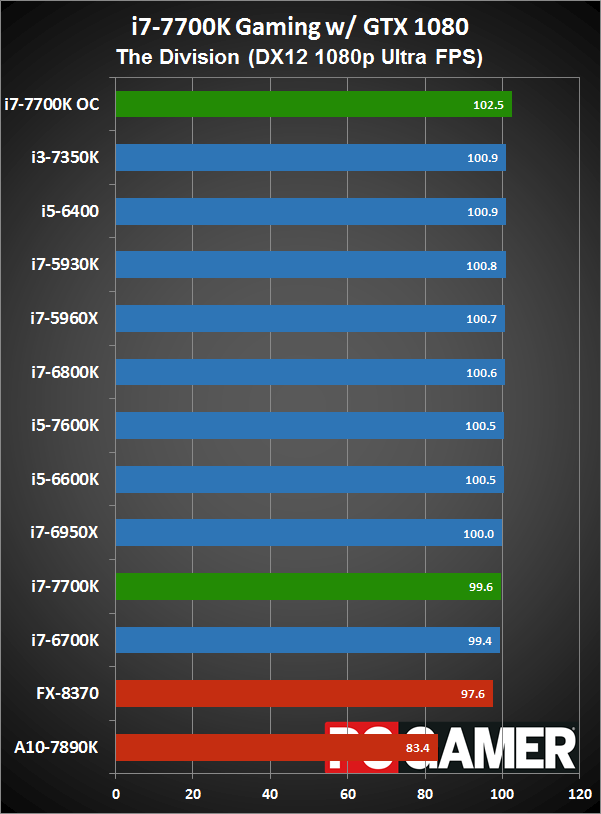
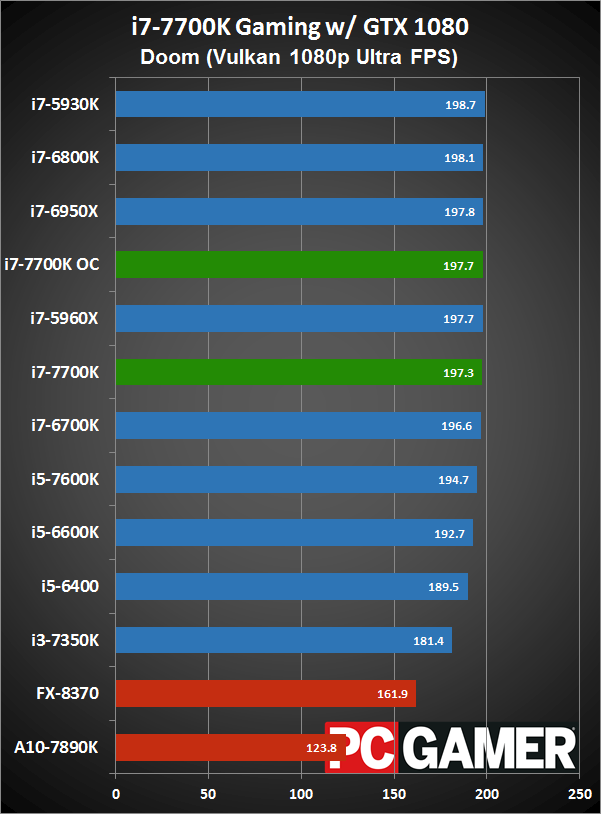
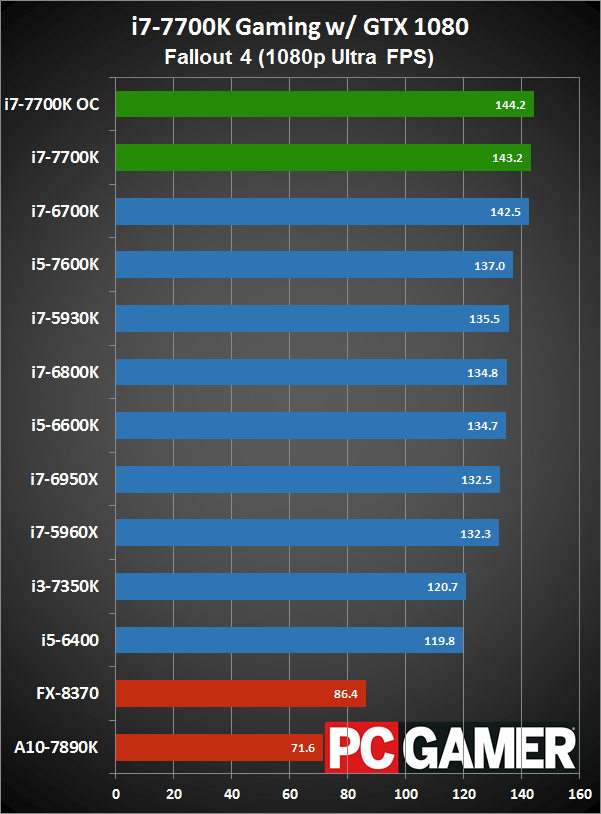
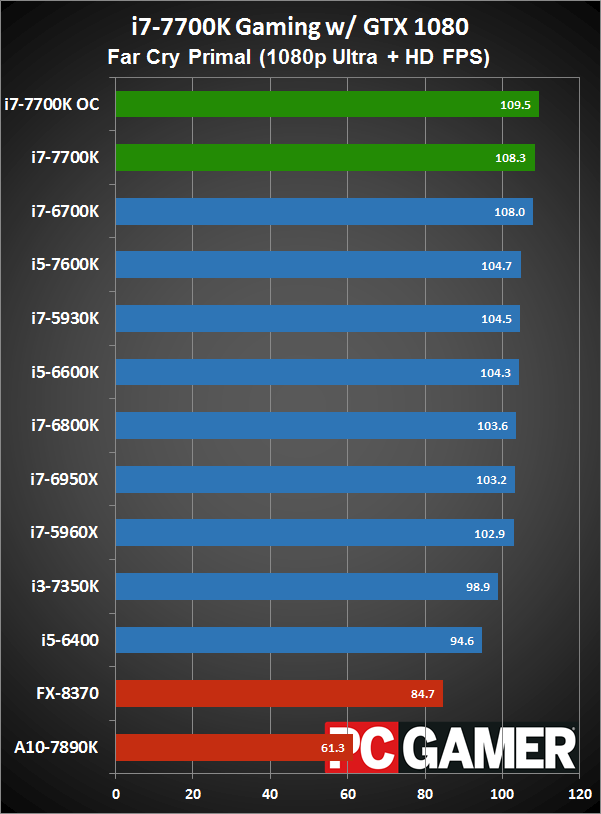
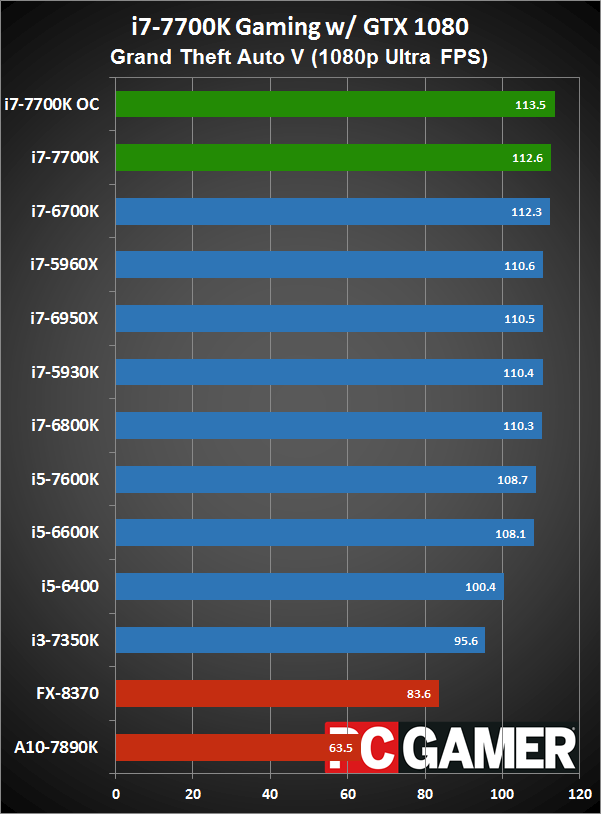
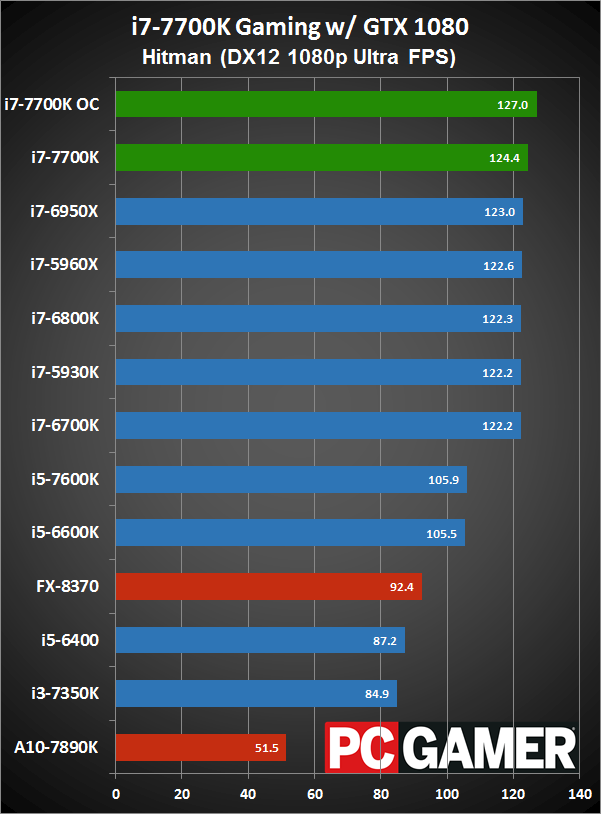
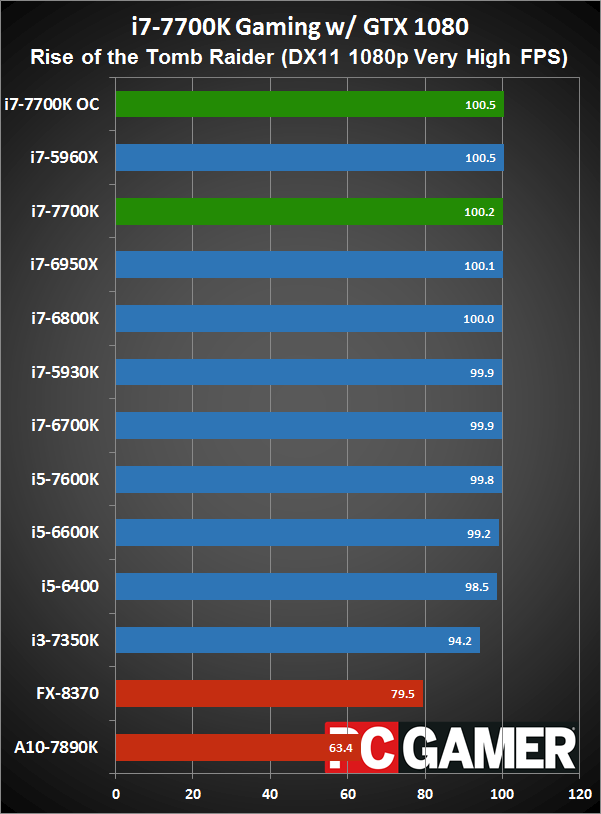
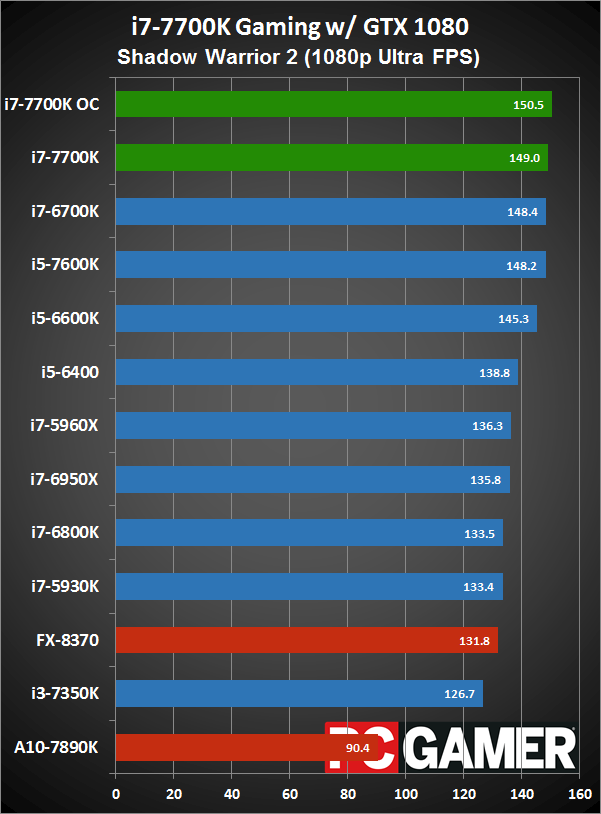
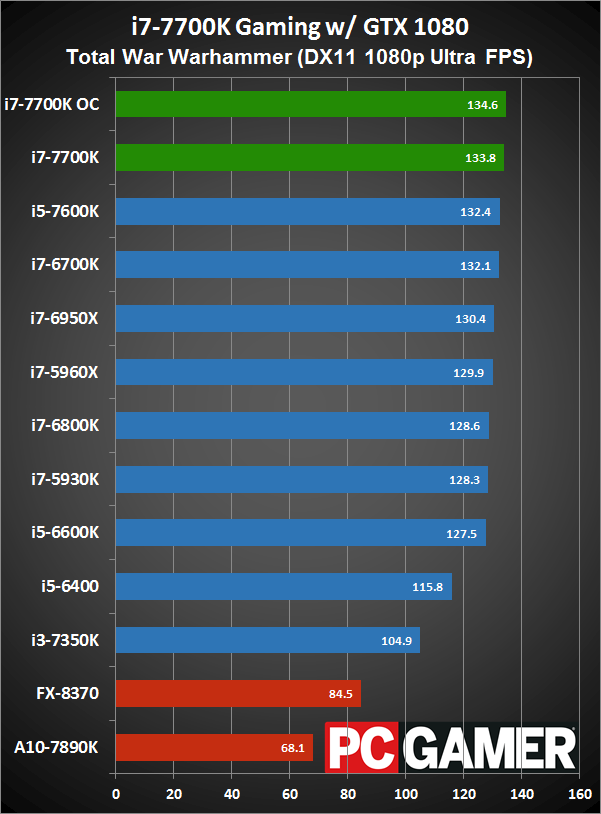
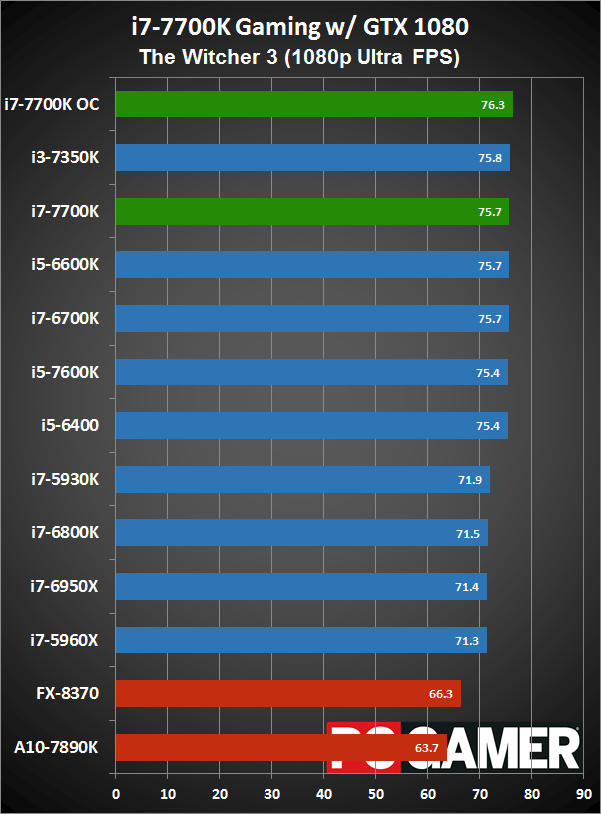
Overall, the i7-7700K is less than one percent faster than the i7-6700K. Overclocking improves average gaming performance by another 1.6 percent over stock, but anything less than five percent is practically meaningless. More importantly, everything from the i5-6600K through the i7-7700K is effectively tied for gaming potential using one of the fastest graphics cards available.
There are slightly more noticeable individual differences in games, of course. Ashes of the Singularity, Civilization VI, and Hitman all show more than a 10 percent improvement in performance going from a 6600K to a 7700K. But with fourteen demanding games tested, more than half show less than a one percent change in performance. It's why we routinely point to the Core i5 unlocked CPUs as the best overall gaming processors—they're 97 percent of the performance of the Core i7 offerings, at two thirds the cost.
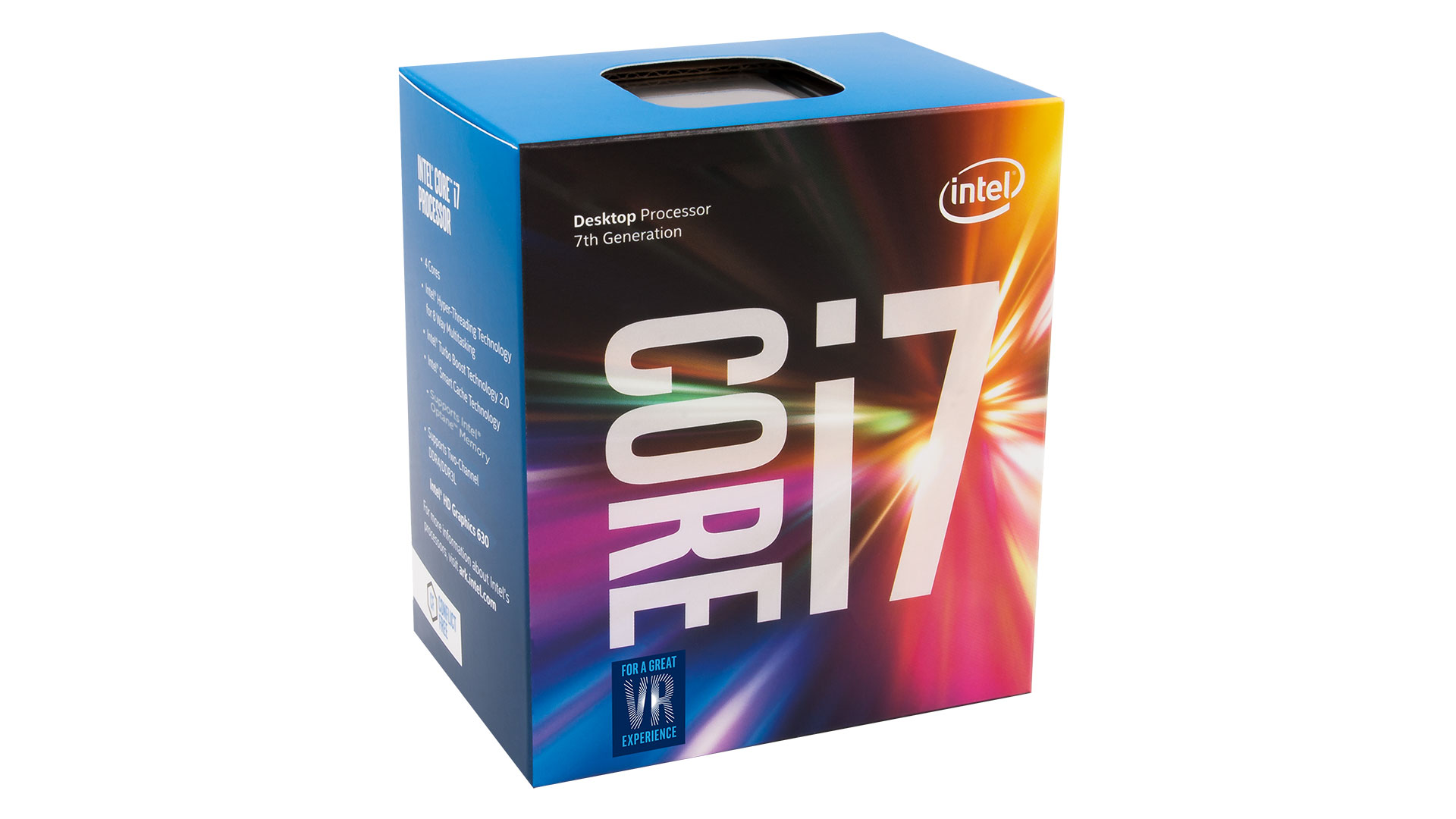
Core i7-7700K: Who's it for?
So who should buy the i7-7700K? For gaming, it's Intel's fastest processor overall, particularly when overclocked, but the margin of victory is pretty slim. The majority of gamers, particularly those planning on running a single GPU (which is what we recommend, given the number of recent titles that don't support multi-GPU), will find everything they need in the 7700K—probably even more than they need. For gaming, most users are better off saving their pennies and picking up an i5-7600K or similar, assuming they even need a new CPU in the first place.
If you already have a Skylake system, or even a Haswell system, forget about Kaby Lake—the performance improvements aren't enough to be meaningful. But if you're looking to build a new Intel system, depending on where you live, the i7-7700K with a Z270 motherboard won't really cost much more than an i7-6700K with a Z170 motherboard. But that still raises the question of whether you should even be looking at Core i7.
For gaming, most users are better off saving their pennies and picking up an i5-7600K or similar, assuming they even need a new CPU in the first place.
What it comes down to is how you plan on using your system. I know tons of people who play games on a CPU that's more than three years old. With a good graphics card upgrade, most CPUs from the i5-2500K onward are still sufficient, unless you're at the top of the graphics stack. Where Core i7 distances itself from Core i5 is when you're doing more complex streaming, or other number crunching outside of games.
The i7-7700K ends up outperforming the i5-7600K by 35 percent on average in our CPU tests. Single-threaded performance isn't much faster, but in video encoding tasks in particular Core i7 can be a significant upgrade. It can also be a big help when streaming games, particularly if you're doing encoding of multiple video streams. If that describes how you use your PC, the extra virtual cores from Hyper-Threading combined with higher clock speeds make the Core i7 a great option.
There's still the red team to consider before taking the plunge. The old AM3+ FX-8370 gets annihilated by the i7-7700K, and the A10-7890K is less than half the performance (but also less than half the price). I wouldn't look to either of those, however, as AMD's Ryzen is right around the corner. AMD has repeatedly stated they'll launch in Q1, which means by the end of March, and current indications are that it will be early March or even late February. If you're thinking about building a new system, at this point you should at least wait and see what Ryzen has to offer. At worst, you wait an extra month; at best, you might get more performance for less money.
Further out, Intel's Skylake-X and Kaby Lake-X are coming later this year (rumor: August). That's a ways off, but if you're eyeing the X99 platform, those will be the new 'enthusiast' Intel chips and should bring 10-20 percent more performance than their Broadwell-E counterparts. There are also rumors of a 6-core Coffee Lake chip coming to the Z270 platform in about a year, but we'll have to see if that actually pans out. I suspect we might see that part even sooner if AMD's Ryzen starts making waves.
The Core i7-7700K ends up as yet another incremental improvement in CPU performance between generations. It feels a lot like the Devil's Canyon refresh of Haswell, with higher clocks and a new platform refining the earlier experience. I like that Z270 motherboards with two and three M.2 slots are relatively common, and the new features aren't bad, but it's difficult to pin down exactly who will want to upgrade to Kaby Lake. If Skylake didn't float your boat in mid-2015, the 18 month wait for Kaby Lake must feel even more underwhelming. Here's hoping something happens in the coming year to shake up the CPU market in meaningful ways.
The i7-7700K is Intel's highest clocked CPU ever, but ultimately it's only a minor update to Skylake with incremental improvements.
Jarred's love of computers dates back to the dark ages when his dad brought home a DOS 2.3 PC and he left his C-64 behind. He eventually built his first custom PC in 1990 with a 286 12MHz, only to discover it was already woefully outdated when Wing Commander was released a few months later. He holds a BS in Computer Science from Brigham Young University and has been working as a tech journalist since 2004, writing for AnandTech, Maximum PC, and PC Gamer. From the first S3 Virge '3D decelerators' to today's GPUs, Jarred keeps up with all the latest graphics trends and is the one to ask about game performance.
